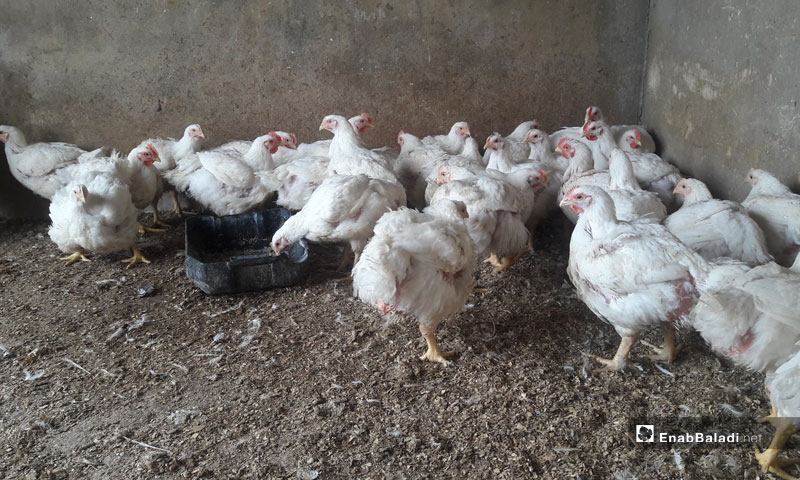In the markets of Daraa governorate, the prices of chicken are rocketing, reaching the double in the past few days, triggered by the material’s scarcity for reasons topped with the rising cost of production and climate-related factors, during winter, which resulted in the farmers’ massive losses.
The phenomenon is not limited to Daraa governorate, as it is witnessed in the rest of the Syrian provinces, according to the Syrian regime’s media outlets, including Tishreen newspaper, which quoted the Ministry of Domestic Trade and Consumer Protection on March 10, that the rise amounted to 35%, where a chicken meat’s kilogram is being sold for 2300 Syrian pounds.
Jamal Shuaib, the Assistant Minister of Domestic Trade and Consumer Protection, told the newspaper the following: “We ordered that the directors of supply departments examine the status of the new prices, because the decrease in the chicken prices is not in Damascus alone, but in all the governorates.”
Rising Production Costs
In winter, raising chicken batches requires heating means, but the increase in the fuel (diesel) prices is boosting the costs of the production process because the farmers have to provide heating around the clock.
Mahmoud, a 33-year-old owner of a slaughterhouse, told Enab Baladi that the rise in the chicken meat prices in the governorate has to do with its scarcity in the market because chicks were not being raised in the winter.
He added that the losses that affected the poultry farmers last year triggered them not to raise chicks in the past three months, December, November and February, explaining that “poultry farms need heating, which is costly, particularly in the shadow of the increase in the prices of fuel, for the price of a single liter of diesel in the winter amounted to 500 Syrian pounds. […] Winter is the season of diseases, where poultry develop flue and demand highly expensive medicines.”
The slaughterhouse owner’s statements correspond to the findings of the tour that the Tishreen newspaper conducted, visiting several chicken meat shops in the al-Jazmatiya market in al-Midan, Damascus, for the owners of these shops said that “the price increase is due to the death of a massive number of chickens because of cold and lacking heating means as a result of the scarcity of fuel and many farmer’s dependence on coal for heating the chickens, which did not really meet the need.”
This is in addition to the increase of the costs of raising chicken and the high prices of fodder, which led to the closing down of 17 poultry houses in rural Damascus, while many of the farmers have stopped selling chickens until the currently being raised chicks are grown, turning into chickens, and ready for sale.
Price Increase Affects Demand
The sudden increase in the prices of chicken from 650 to 1000 Syrian pounds in Daraa, led to the people’s abstinence from buying this commodity, according to Mahmoud, the slaughterhouse owner, adding that the sales rates, compared to the previous months, have markedly decreased, “for the people are barely buying pieces of chicken meat, let alone buying a whole chicken.”
Abu Salim, a 57-year-old man, told Enab Baladi that the increase in the chicken meat prices promises the citizens additional burdens, especially with the increases in the prices of other materials needed every day, on top of which is fuel.
Abu Salim added that “earlier on, I used to buy a chicken, weighing 2 kilograms, for 1300 Syrian pounds, but today to buy a chicken of the same weight, I have to pay 1800 Syrian pounds.”
According to Abu Salim, the soaring prices were not only limited to raw chicken, as it also affected the prices of roasted chicken, for the price of a single roasted chicken amounted to 2800 Syrian pounds, while the price of a single Shawarma sandwich varied between 350 and 500 Syrian pounds.
The increase in the prices of chicken in the various Syrian governorates cannot only be attributed to the losses that befell the farmers in the past three months due to weather conditions and the rising costs of production, for the affair also relates to the latest steps undertaken by the government of the Syrian regime, which provided for regulating and preventing the entry of smuggled Turkish chicken into the markets.
On March 12, al-Watan newspaper, close to the regime, quoted the Assistant Minister of Domestic Trade and Consumer Protection Jamal Eddin Shuaib, as saying: “The Directorates of Domestic Trade in the governorates, in cooperation with the General Customs Administration, have intensified their patrols in the markets, until they prevented the entry of smuggled Turkish chickens almost completely.
It is worth mentioning that on the Syrian markets the smuggled Turkish chicken meat was being sold for prices less that of the local chicken meat.

